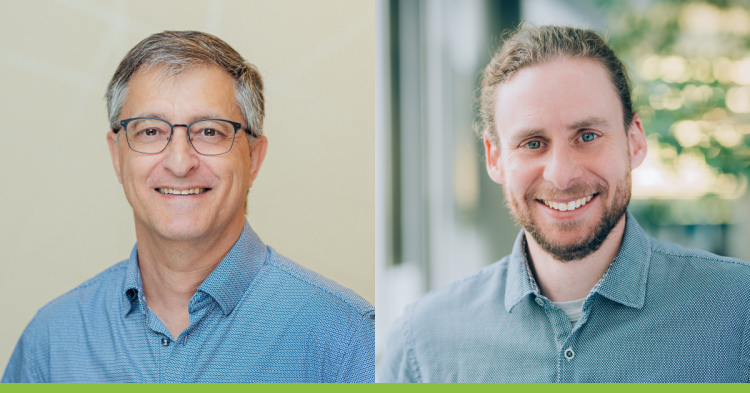Programs led by Professors Michel Gamache and Félix Gervais have been awarded $762,746 from Fonds de recherche du Québec Nature et technologie (FRQNT) and the Ministère des Ressources naturelles et des Forêts.

Professors Michel Gamache and Félix Gervais.
Photos: Caroline Perron
The Joint Research Program on Sustainable Development in the Mining Sector was developed to encourage researchers from Québec universities and colleges working in various fields to study the technical, environmental, and technological challenges encountered in Québec's geological context. After an initial call for proposals, 15 people were awarded a total of $6.09 million in funding to carry out 16 research projects.
Two of these projects are being conducted by researchers from Polytechnique Montréal:
Digital twins for mine-to-process integration: geometallurgy, energy sobriety and decarbonization
- Lead researcher: Michel Gamache, Full Professor, Department of Mathematics and Industrial Engineering
- Amount: $381,000
Led by Professor Gamache, this research program involves developing virtual replicas known as digital twins of physical processes and operations in mining facilities. Digital twins are continually updated using real-time data sent from sensors located on the duplicated objects and their environments. These replicas make it possible to assess process conditions, identify potential faults for subsequent verification or testing, and potentially propose new solutions. Digital twins come in many forms and use a variety of tools to support decision-making, such as simulations, optimization methods and artificial intelligence.
The research program will focus on developing digital twins for the purposes of coordinating vehicles in underground networks in real time, scheduling mine operations in real time, managing the flow of ore to processing plants, and efficiently managing electric equipment. The digital twins will help optimize operations, reduce energy costs and maximize production.
The co-researchers for this program are Jean-Marc Frayet, Full Professor in the Department of Mathematics and Industrial Engineering at Polytechnique Montréal, and Jocelyn Bouchard, Full Professor in the Faculty of Science and Engineering at Université Laval. Another five people pursuing master's, PhD or post-doctoral studies will receive training through the various projects conducted under this research program.
Strategic metals associated with orogenic granitic pegmatites in eastern Grenville Province: enrichment, emplacement and geophysical detection
- Lead researcher: Félix Gervais, Associate Professor, Department of Civil, Geological and Mining Engineering
- Amount: $381,746
Led by Professor Gervais, this research program will study granitic pegmatites as potential sources of rare earth elements (REEs), which are used to make high-tech products like electric vehicle batteries. The goal is to understand the process through which granitic pegmatites become enriched with REEs and establish a geological model for the formation of granitic pegmatites mineralized with REEs. Ultimately, this will help inform mining exploration in the area.
The research team will start by optimizing advanced geoscientific tools such as thermodynamic modeling, fluid inclusion analysis and uranium-lead (U-Pb) dating. Then they will reconstruct the processes controlling granitic pegmatite enrichment from their source in the deep crust (more than 30 kilometers down) to their emplacement in the upper levels of the crust (10 to 15 kilometers down) in the Grenville Province geological region. After determining the specific petrophysical signature of REE-enriched granitic pegmatites, it will be possible to develop geophysical tools for detecting REE deposits in areas covered by a sedimentary layer called overburden.
The co-researchers for this program are Charles L. Bérubé, Assistant Professor in the Department of Civil, Geological and Mining Engineering at Polytechnique Montréal , and Bertrand Rottier, Associate Professor in the Faculty of Science and Engineering at Université Laval. Nine university students will receive training through this research program.
Congratulations to our researchers!
Learn more













